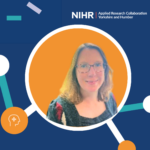What is ACCESS-ED?
ACCESS-ED is a research study aiming to establish the validity, sensitivity and specificity of the following questionnaires to identify eating disorders in young people:
- Eating Disorder Examination – Questionnaire Short (EDE-QS)
- The novel Avoidant and Restrictive Food Intake Disorder questionniare (ARFID)
These cover the full spectrum of eating disorders including anorexia nervosa, bulimia nervosa, binge eating disorder and ARFID (avoidant/restrictive food intake disorder).
What does the study involve?
The study will recruit secondary school students from Age of Wonder schools in Bradford. Students will participate in two sessions, on separate days, to complete short questionnaires and a clinical interview with a trained member of the research team. The following questionnaires and clinical interviews will be completed in each of the sessions.
Session 1: ARFID, Comprehensive Autistic Trait Inventory (CATI) questionnaire and Strengths and Difficulties Questionnaire (SDQ), followed by the Pica, ARFID and Rumination Disorder Interview (PARDI).
Session 2: EDE-QS and Revised Children’s Anxiety and Depressions Scale (RCADS), followed by the Eating Disorder Examination clinical interview.
Why are we interested in this?
Historically eating disorder research has been underfunded compared to other mental health disorders. Recent research indicates the prevalence of eating disorders has increased, but there are inequalities in who is accessing care.
Establishing whether these questionnaires are sensitive and specific can help to identify young people with clinically diagnosable eating disorders. Clinicians can use this information to plan eating disorder services to meet the local and national population need.
ACCESS-ED builds on existing research looking at eating disorders in the Age of Wonder study. The inclusion of the EDE-QS and recently the ARFID questionnaire in routine Age of Wonder data collection provides a unique opportunity to study eating disorders in a diverse multi-ethnic cohort.
Support for young people participating in ACCESS-ED
We understand the sensitive nature of eating disorders, especially during adolescence. We are working in close collaboration with the local CAMHS Eating Disorder Team to ensure students who require further support are referred to the appropriate services. All students participating in our study will also receive signposting to mental health and eating disorder resources and mental health support services available in their local area.
Lead investigators:
Prof Francesca Solmi – University College London
Dr Helen Bould – University of Bristol
Dr Ruth Wadman – University of York
Prof Simon Gilbody – University of York and Hull York Medical School
For more details, contact:
Nathan Dawkins, Senior Research Fellow, Nathan.Dawkins@bthft.nhs.uk
Haniya Mazhar, Research Assistant, Haniya.Mazhar@bthft.nhs.uk

